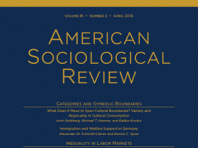SAGE Publications Inc: American Sociological Review: Table of Contents
Clustered Vulnerabilities: The Unequal Effects of COVID-19 on Domestic Violence
American Sociological Review, Ahead of Print.
How did the COVID-19 pandemic affect domestic violence? We might expect that the most marginalized victims experienced the most dramatic upticks in violence during the pandemic. However, through life-story interviews, I found that survivors who were enduring abuse, poverty, housing insecurity, and systems involvement pre-COVID did not suffer worse abuse during the pandemic. For multiply marginalized survivors, COVID did not produce more violence directly, but instead worsened the social contexts in which they already experienced violence and related problems, setting them up for future instability. The small group of survivors in this study who did experience COVID as a novel period of violence were likely to be middle-class and better-resourced. To explain these findings, I suggest moving away from a model of crisis as “external stressor.” I offer the concept “clustered vulnerabilities” to explain how—rather than entering in as “shock”—crisis amplifies existing structural problems: social vulnerabilities pile up, becoming denser and more difficult to manage. “Clustered vulnerabilities” better explains crisis in the lives of marginalized people and is useful for analyzing the relationship between chronic disadvantage and crisis across cases.
The Cultural Consequences of Market Transition: An Empirical Examination of Rising Materialism in Twenty-First-Century China
American Sociological Review, Ahead of Print.
This study examines how markets affect personal culture in the context of postsocialist China. Drawing on several bodies of literature, I argue that China’s transition to a market economy promotes materialist values via two causal pathways. First, market transition entails a process of economic liberalization, which accentuates economic incentives and exacerbates existential insecurity. Second, market transition also entails a process of commodification that, by immersing individuals in market relations, crowds out intrinsic motives and normalizes the pursuit of material self-interests. My empirical analysis uses repeated cross-sectional data from a large-scale national survey to demonstrate the effect of market transition through the lens of work values. Taking advantage of China’s regional variations in the pace of institutional change, I show that, between 2005 and 2015, provinces where market transition had made greater progress tended to experience a sharper rise in materialist work values. Additional analyses reveal significant differences in work values between state-sector employees and workers in the market sector, and that the relationship between market transition and materialist values extends beyond the work domain. These findings contribute to the theoretical literature on the cultural consequences of markets and the empirical knowledge on cultural change in contemporary China.
The Culture of Censorship: State Intervention and Complicit Creativity in Global Film Production
American Sociological Review, Ahead of Print.
How does state censorship shape global creative production? To explore the merger of art and the state in a global context, I adopt a micro-sociological approach to examine the culture of censorship and reconceptualize censorship as an ongoing, social process. Based on participant observation within a global film studio and interviews with industry insiders in Beijing and Los Angeles, I investigate how global cultural producers navigate China’s rigid film censorship system. My analysis reveals how China’s state censors use multistage gatekeeping and intermediated censorship to infiltrate the creative process and exert global influence. I then show how informality transforms these organizational procedures into a relational process that is hard to trace. In this, studio executives and filmmakers are induced to engage in complicit creativity, seeking creative negotiations through working with, rather than against, the state; specifically, they practice concession, reconfiguration, and collusion. These processes anchor a culture of censorship characterized by the symbiotic relationship between censors and creators, epitomizing a dynamic dance between everyday state power and everyday resistance. This relational model of censorship provides useful analytic scaffolding, extending our knowledge of the inner workings and consequences of state intervention in the new global cultural economy.
“Stepping-Stone” versus “Dead-End” Jobs: Occupational Structure, Work Experience, and Mobility Out of Low-Wage Jobs
American Sociological Review, Volume 89, Issue 2, Page 298-345, April 2024.
Does working in a low-wage job lead to increased opportunities for upward mobility, or is it a dead-end that traps workers? In this article, we examine whether low-wage jobs are “stepping-stones” that enable workers to move to higher-paid jobs that are linked by institutional mobility ladders and skill transferability. To identify occupational linkages, we create two measures of occupational similarity using data on occupational mobility from matched samples of the Current Population Survey (CPS) and data on multiple dimensions of job skills from the O*NET. We test whether work experience in low-wage occupations increases mobility between linked occupations that results in upward wage mobility. Our analysis uses longitudinal data on low-wage workers from the 1979 National Longitudinal Study of Youth (NLSY) and the 1996 to 2008 panels of the Survey of Income and Program Participation (SIPP). We test the stepping-stone perspective using multinomial conditional logit (MCL) models, which allow us to analyze the joint effects of work experience and occupational linkages on achieving upward wage mobility. We find evidence for stepping-stone mobility in certain areas of the low-wage occupational structure. In these occupations, low-wage workers can acquire skills through work experience that facilitate upward mobility through occupational changes to skill and institutionally linked occupations.
Honor among Crooks: The Role of Trust in Obfuscated Disreputable Exchange
American Sociological Review, Volume 89, Issue 2, Page 391-419, April 2024.
When people want to conduct a transaction, but doing so would be morally disreputable, they can obfuscate the fact that they are engaging in an exchange while still arranging for a set of transfers that are effectively equivalent to an exchange. Obfuscation through structures such as gift-giving and brokerage is pervasive across a wide range of disreputable exchanges, such as bribery and sex work. In this article, we develop a theoretical account that sheds light on when actors are more versus less likely to obfuscate. Specifically, we report a series of experiments addressing the effect of trust on the decision to engage in obfuscated disreputable exchange. We find that actors obfuscate more often with exchange partners high in loyalty-based trustworthiness, with expected reciprocity and moral discomfort mediating this effect. However, the effect is highly contingent on the type of trust; trust facilitates obfuscation when it is loyalty-based, but this effect flips when trust is ethics-based. Our findings not only offer insights into the important role of relational context in shaping moral understandings and choices about disreputable exchange, but they also contribute to scholarship on trust by demonstrating that distinct forms of trust can have diametrically opposed effects.
A Hidden Barrier to Diversification? Performance Recognition Penalties for Incumbent Workers in Male-Dominated Occupations
American Sociological Review, Volume 89, Issue 2, Page 256-297, April 2024.
Responding to persistent gender inequity, organizations have adopted diversity initiatives to promote women’s representation in traditionally male-dominated occupations. Although studies have identified challenges to these initiatives for women entering occupations, we uncover a performance recognition penalty for incumbent workers originating from the process of occupational diversification. As women incrementally enter a male-dominated occupation, a conflict arises between the changing gender composition at the work-unit level and the masculine “ideal worker” prototype embedded in the occupation. We propose that this conflict will lower the performance expectations of the work unit, decreasing the individual likelihood of performance recognition for each worker in the unit. Using detailed panel data on police officers, we found that an officer’s individual likelihood of being nominated for a performance award consistently declined when their police unit proportionately increased in women officers. Both men and women managers enacted this penalty, with men managers penalizing men subordinates more than women subordinates. This pattern remained for awards recognizing exceptional performance, regardless of gender-typing of the unit or its work tasks, and considering officer tenure and attrition from the unit. Our findings offer novel insights into the challenge of diversifying male-dominated occupations.
Learning to Think Like an Economist without Becoming One: Ambivalent Reproduction and Policy Couplings in a Masters of Public Affairs Program
American Sociological Review, Volume 89, Issue 2, Page 227-255, April 2024.
In recent years, sociologists have labored to understand how economists have gained influence over policymaking. We extend this research by shifting focus from the matter of influence to the matter of policy training. Granted that economists already have influence, how do future policy professionals learn economic rationales? How is this mindset transmitted to hesitant students? By asking these questions, we bring socialization back into institutional research on “new” professionals. Utilizing data from an ethnography of a Masters of Public Affairs program, we find that students learn economics through a process of “ambivalent reproduction”: they learn to “think like an economist without becoming one.” They remain skeptical and reject the notion that they are economists, and when they use economics in their future policy work they do so in limited ways. Nonetheless, ambivalent reproduction sustains the policy status-quo and allows economics to remain influential without true belief. Ambivalent reproduction provides a new means for understanding the loosely coupled influence of economics on policy, and it contributes to the sociology of economics, inhabited institutionalism, and professional socialization.
Safe as Houses: Financialization, Foreclosure, and Precarious Homeownership in the United States
American Sociological Review, Volume 89, Issue 2, Page 197-226, April 2024.
The financialization of the U.S. economy has had important implications for household well-being, but the mechanisms connecting financialization and precarity have not been fully identified. This research identifies mortgage foreclosure as a nexus connecting macro-level financialization to an array of downstream consequences for homeowners and asks (1) how mortgage securitization, a key technology of financialization, enabled new foreclosure practices; and (2) how these practices affect housing precarity among homeowners at risk of foreclosure. To answer these questions, I analyze court records, interviews with key participants, and primary source documents to examine the evolution of mortgage foreclosure in Cook County, Illinois, from 1992 to 2006. I find that as mortgage securitization transformed the social and economic relations between borrowers and lenders, foreclosure became actively managed as both a driver of costs and a source of profits, and loan administrators and their attorneys worked to reduce costly borrower protections. These changes increased housing precarity by making foreclosure more frequent and more rapid.
Cultural Tariffing: Appropriation and the Right to Cross Cultural Boundaries
American Sociological Review, Volume 89, Issue 2, Page 346-390, April 2024.
Why are some acts of cultural boundary-crossing considered permissible whereas others are repudiated as cultural appropriation? We argue that perceptions of cultural appropriation formed in response to the emergence of cultural omnivorousness as a dominant form of high-status consumption, making boundary-crossing a source of cultural capital. Consequently, the right to adopt a practice from a culture that is not one’s own is determined on the basis of the costs and benefits one is presumed to accrue. People express disapproval at boundary-crossing if they believe it devalues or extracts value at the expense of the target culture. We call this process cultural tariffing. We test our theory in a between-subject experimental design, demonstrating that individuals who enjoy a privileged social position, as inferred from their social identity or socioeconomic status, have less normative latitude to cross cultural boundaries. This is explained by perceptions that these actors are either devaluing or exploiting the target culture. While symbolic boundaries and cultural distinction theories are inconsistent with our results, we find that Americans who are disenchanted about group-based social mobility are the most likely to be outraged by cultural boundary-crossing. Cultural tariffing, we therefore posit, is a form of symbolic redistribution.
American Sociological Review
The American Sociological Review is the flagship journal of the American Sociological Association (ASA). The ASA founded this journal in 1936 with the mission to publish original works of interest to the sociology discipline in general, new theoretical developments, results of research that advance our understanding of fundamental social processes, and important methodological innovations. All areas of sociology are welcome in the American Sociological Review. Emphasis is on exceptional quality and general interest. The American Sociological Review does not publish book reviews.


